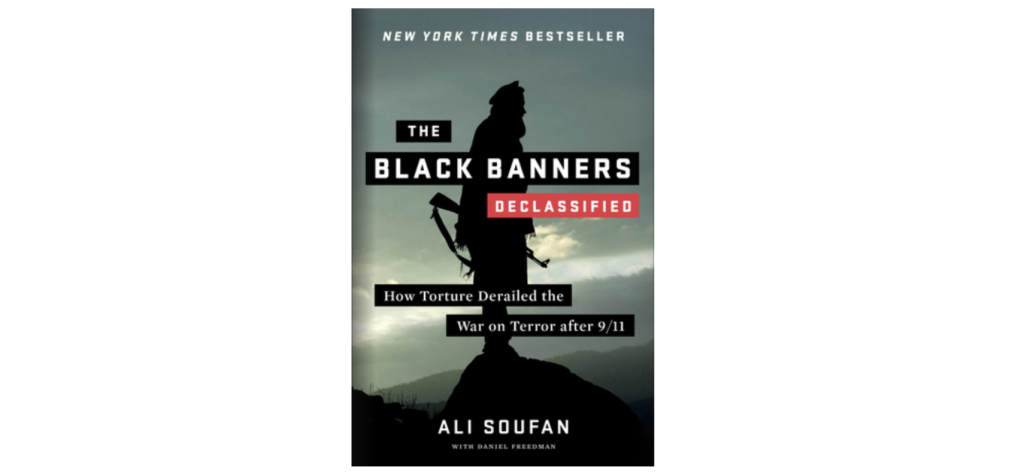Aided by MFIA Clinic, FBI agent’s book on enhanced interrogation rereleased

Note: A version of this post originally appeared on the Yale Law School’s Media Freedom and Information Access Clinic’s website.
A book by former FBI agent Ali Soufan was rereleased recently and now includes his eyewitness account of the CIA’s harsh interrogation of Guantanamo detainee Abu Zubaydah and the program’s failure in garnering useful information.
Retitled The Black Banners (Declassified): How Torture Derailed the War on Terror After 9/11, Soufan’s book was originally released in 2011, but the CIA made its publisher, W.W. Norton & Company, remove most of its discussion of the CIA’s torture of Zubaydah. The withheld material has now largely been restored thanks to the creative litigation efforts of the Media Freedom & Information Access (MFIA) Clinic and Yale Law School students David Froomkin ’22 and Katrin Marquez ’20.
MFIA’s client was not, in fact, Soufan himself. Acting on behalf of award-winning documentarian Alex Gibney and former New York Times reporter Ray Bonner, MFIA succeeded in compelling the CIA to lift the restrictions it imposed on Soufan by asserting that the CIA was violating their rights to receive information that Soufan was otherwise willing to share. Gibney and Bonner are currently working on a documentary about Zubaydah and the CIA’s enhanced interrogation program, and wanted to interview Soufan, but he would not talk as long as the CIA restrictions remained in place on that topic.
Soufan was the lead FBI interrogator who questioned suspected al Qaeda leader Zubaydah after he was first taken into U.S. custody. Soufan had questioned many other notorious terrorism suspects over the course of his years with the bureau. He recalls in his book that he managed to obtain useful information from Zubaydah using standard FBI questioning techniques before the CIA took over the interrogation. Soufan has long contended that the CIA’s subsequent use of enhanced interrogation techniques produced no actionable intelligence from Zubaydah.
After leaving the FBI, Soufan wrote a book about his experiences fighting the war on terror but was effectively silenced from telling the whole story by the CIA. For the past nine years, the CIA insisted that nearly the entire chapter about the interrogation of Abu Zubaydah, as well as other sections of the book, could not be published because they disclosed classified information. The book was released to the public with blacked out sections over all of the material to which the CIA objected.
Subsequently, much of what Soufan had written about was made public by a declassified 2014 Senate study on the CIA’s extremely harsh interrogation techniques. Many aspects of these topics were also already published in multiple CIA-approved books written by high ranking CIA officials who were at the helm of orchestrating the enhanced interrogation program. These CIA-approved books included many details about Zubaydah and the enhanced interrogation program that had been removed from Soufan’s book. Yet the CIA still declined to allow Soufan to speak.
The MFIA clinic took on the case after Gibney and Bonner contacted Soufan in connection with their documentary. Frustrated that the CIA was pursuing what Soufan has called a “disinformation campaign” to mislead the public and lawmakers into believing that torture works — Soufan wanted to tell Gibney and Bonner what he observed. But because of the CIA’s classification of his book, he was unable to speak to them, on or off camera.
To address this roadblock, the MFIA clinic went to court on behalf of Gibney and Bonner, asserting that the CIA’s effective gag order on Soufan was infringing upon the journalists’ First Amendment rights. The lawsuit was filed in late 2018 in the Southern District of New York. In response, the government agreed to review Soufan’s book anew, and to reconsider the classification status of the removed material. Through this process of review and negotiations, the CIA agreed to remove most of the redactions, allowing Soufan to describe publicly what he observed during these enhanced interrogations for the first time. This week the largely unsealed book is finally being published in its entirety.
Gibney and Bonner expect to complete their documentary for release next year. Gibney greeted news of the release of Soufan’s unredacted book by tweeting, “This is an important day.” As Bonner explained, “thanks to the Yale Law students, Ali Soufan can now give a full interview and we now have reams of useful documents that you [the MFIA Clinic staff and its law students] were able to get us through FOIA.”
In announcing the release of the unredacted book, Soufan expressed his gratitude for “the amazing team at Yale Law School,” and ultimately told the New York Times that, “if you fight for the truth hard enough, eventually you will win.”

